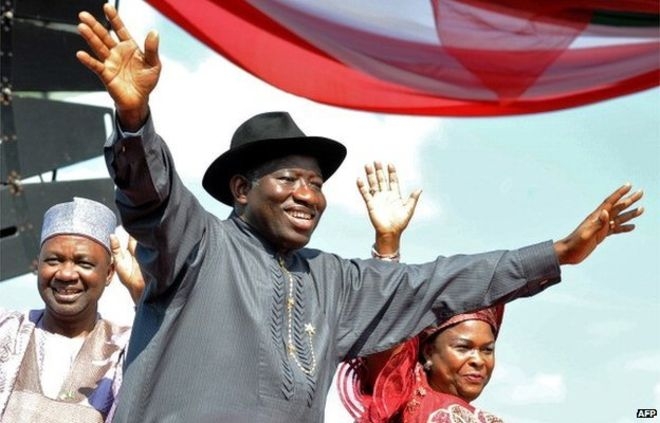
As his name suggests, Nigeria’s President Goodluck Jonathan has a habit of being in the right place at the right time.
Until November 2009, he was serving out his time as a low-key deputy from the south of the country to a low-key president from the north.
But then, President Umaru Yar’Adua was taken to hospital in Saudi Arabia and was not seen again in public until he died on 5 May 2010.
Step forward, Mr Jonathan. After months of political wrangling, Nigeria’s elite finally accepted him as acting leader in February 2010 when the ailing president returned home, but remained too ill to govern.
Barely 12 hours after Mr Yar’Adua’s death, Mr Jonathan was sworn in as the new president and commander-in-chief of the armed forces of Africa’s most populous nation – one of its most fractious democracies.
Not bad for a man who had never been elected to major public office in his own right.
‘Super pastors’
He defied the governing People’s Democratic Party’s (PDP) tradition of alternating presidential power between north and south after two terms of office by winning the party’s primaries.
In 2011, he won his first election – for president – despite opposition claims of fraud, and is now seeking another four-year term in office
Goodluck Jonathan in focus:
Has a penchant for fedora hats
Regular church-goer
Middle name, Ebele, means “God’s wish”
Fond of saying he never had shoes as a child because of poverty
Told journalists in 2012 that he would not declare his assets because he did not “give a damn about it, even if you criticise me from heaven”
Denied reports in 2014 that his net worth is about $100m (£62m)
Mixing religion and politics
Serious about tackling corruption?
Born in 1957 in the oil-rich Niger Delta region, Mr Jonathan is a Christian from the Ijaw ethnic group.
He is said to be extremely close to the “super pastors” of Nigeria’s hugely popular Pentecostal churches.
His family’s trade was canoe-making, but he studied zoology at university.
He worked as an education inspector, lecturer and environmental protection officer before going into politics in 1998.
Just as his rapid rise to power in the federal government owed a lot to luck, so too did his promotion to state governor.
Elected as deputy governor for his home state, Bayelsa, in 1999, he was once again serving his time without particular distinction.
Until, that is, his boss was impeached on corruption charges.
‘Meteoric rise’
Mr Jonathan took over as governor and two years later was hand-picked by former President Olusegun Obasanjo to run on the PDP’s ticket as vice-presidential candidate in 2007.
PDP insiders regard him as a politician without a political base – and more of an administrator than a leader.
It had been suggested that Nigeria’s many groups of powerbrokers agreed to let Mr Jonathan formally become acting president only because he was not seen as a threat.
But he threw his hat into the ring at the PDP primaries and with several central and northern states backing him, proved his political acumen.
“There has not been any rise that’s been so meteoric in Nigeria,” analyst Charles Dokubo said in 2010.
On the relevance of the acting president’s name, he said: “What is luck? Luck is when you can take advantage of an opportunity. He was in the right place at the right time.”
Journalist Ben Shemang is among the many Nigerians who believe Mr Jonathan’s name has given him an advantage.
He told the BBC that Mr Jonathan was doubly lucky as his other given name is equally propitious – Ebele, which means “God’s wish”.
“That tells you that it was the wish of the parents for him to be successful,” he said.
Amnesty
His rise to power, though, has not been without its share of controversy.
His wife, Patience, was investigated by anti-corruption officials in 2006 over allegations she tried to launder some $13.5m (£8.5m).
She has never been convicted of any wrongdoing over the affair and officials told Associated Press news agency that the case was “an old one”.
If Mr Jonathan’s time as vice-president was distinguished at all, it was through his negotiations with militants in the Niger Delta, who are mostly his fellow Ijaws.
Many of the major militant groups have laid down their weapons as part of a government amnesty.
Defections
But he has had no such luck in the north, where an insurgency by militant Islamist group Boko Haram has gained momentum under his rule.
It has led to his critics accusing him of being ineffectual – a charge he denies.
He suffered a major blow in December 2013 when Mr Obasanjo, his former backer, called on him to step down.
In a widely circulated 18-page letter, Mr Obasanjo accused him of failing to deal with the many problems facing Nigeria – including corruption, piracy, kidnapping and oil theft.
More worryingly for Mr Jonathan, a powerful faction of PDP members – including state governors and MPs – defected to the newly formed opposition All Progressives Congress (APC).
As a result, the PDP lost, for the first time since it took power in 1999, its majority in the lower chamber, the House of Representatives.
Despite this, Mr Jonathan was elected unopposed as the PDP’s presidential candidate at its primaries in December.
“It is difficult to remove the incumbent, but he is barely hanging on,” says BBC Nigeria analyst Peter Okwoche.
Now, Mr Jonathan will be hoping that luck is once again on his side on Valentine’s Day, when he runs against APC candidate Muhammadu Buhari in what is likely to be its most tightly contested presidential election since military rule ended about 15 years ago.
Source: BBC


